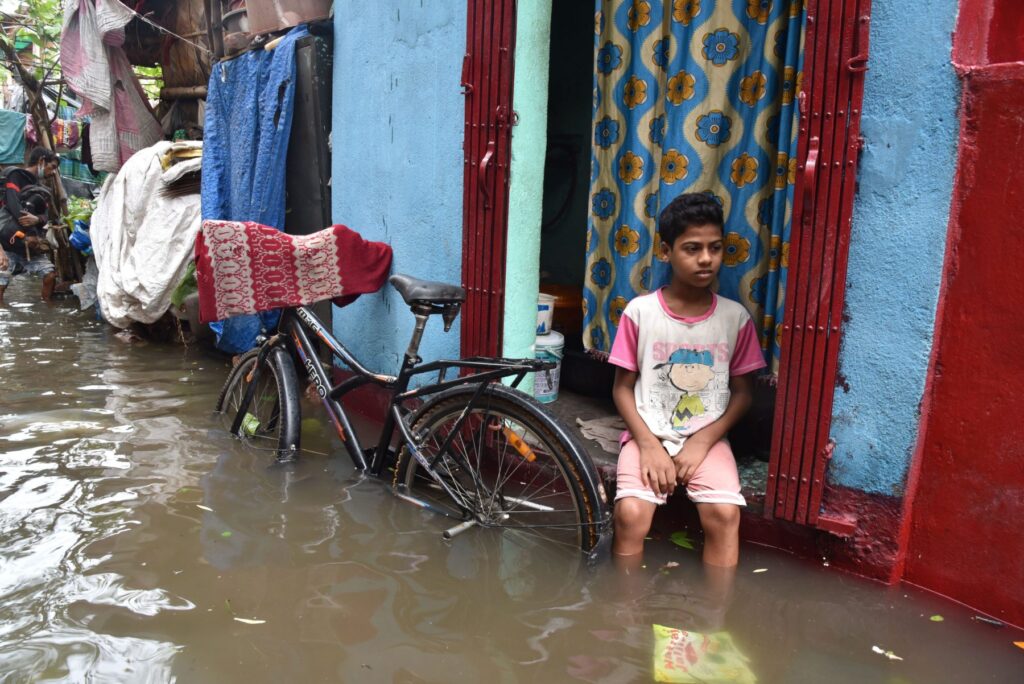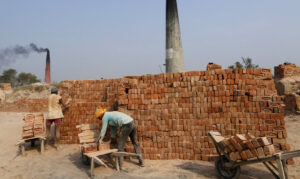Banks Unprepared For Climate Breaking Points

Under the guidelines released by the UGC, environmental education will include areas such as climate change, pollution, sanitation, waste management, conservation of biological diversity, sustainable development, forest and wildlife conservation, management of biological resources and biodiversity (Image: Majority World CIC/Alamy)
India has always been a land of brutal but predictable weather. Now, the climate crisis is expected to change that, with increasingly erratic heat and water extremes unleashed at unusual times, or even simultaneously. While the country has proved to be a model of disaster preparedness in the past, the rising probability of highly disruptive compound weather events – known as ‘black swans’ – represents an unprecedented risk to the economy at large. And despite the mounting warnings from experts, India’s big banks appear to be turning a blind eye to climate risk.
Climate Scorecard For India’s Banks
A recent analysis offers a rare glimpse into how India’s largest commercial banks think about climate change. It finds that they are both underestimating risks to their investors and neglecting the urgency of cutting their own emissions. Researchers at the think tank Climate Risk Horizons examined publicly available information on the 34 largest banks on the Bombay Stock Exchange, representing USD 354 billion (INR 26.81 trillion) as of March 2021.
They found that none of the banks analysed had a comprehensive plan to reach net zero which targeted the full scope of its emissions. These include those produced directly through the bank’s activities, such as heating or emissions from vehicles used for routine operations (known as ‘scope 1’); indirect emissions related for example to energy consumption (known as ‘scope 2’); and those generated up and down the value chain, such as the climate risk exposure resulting from lending for carbon heavy investments (or ‘scope 3)’. Only two of the banks analysed have plans to address scope 1 and 2 emissions by the end of this decade.
There has been “very little movement” on most of the 10 criteria the study assessed, says Ashish Fernandes, CEO at Climate Risk Horizons and an author of the study. “Especially on things like fossil fuels exclusion policies, net zero targets, and long-term scenario analysis for their portfolio.”
Of the banks analysed, only two – Federal Bank and Suryoday Small Finance Bank – have chosen not to finance the construction of new coal power plants or the extension of existing ones, the analysis finds, while Federal Bank has promised it will stop supporting oil and gas exploration. None of the banks analysed have undertaken assessments to understand how climate change may affect their portfolios and, in turn, their investors.
Black Swan Events
‘Black swans’ are low-probability, high impact events that according to the UN Intergovernmental Panel on Climate Change (IPCC) are going to become more frequent as global warming increases. These could include heat waves, agricultural drought or heavy rainfall of unprecedented intensity. South Asia in particular, the IPCC says, will face greater heat and humidity stress throughout the 21st century, as well as more severe rains during the monsoon season.
“These issues are extremely complicated, but banks need to start looking at it because they do have economy-wide implications. You’re talking about extremely large banks,” Fernandes says. “God forbid, there’s a black swan event in India, or maybe two or three smaller black swan events that affect different sectors in a row,” such as a heat wave occurring during crop growing season, combined with a failed monsoon. “You’d have knock on effects not just on agriculture, but on the rural economy at large for the following years.”
Economy-Wide Threats
“If you look at the climate projections for India, it’s pretty clear that within the next couple of decades no sector is going to stay untouched,” says Fernandes. “Take energy or large infrastructure, there are going to be impacts.” The severity of these impacts for India’s banks will depend on their specific investments, for example “if a bank’s portfolio is overly reliant on coal, or on large hydro in the Himalayas”. The construction sector will surely be affected, he says, and there are going to be significant impacts on agricultural businesses as well.
Failing to identify climate risks is particularly problematic for India and the South Asian region at large, given its high vulnerability. The UK consultancy Verisk Maplecroft ranked 576 of the world’s largest cities based on their exposure to environmental and climate-related risks. It found that Asia is home to 99 of the 100 most vulnerable cities, of which 43 are in India. While Jakarta topped the list, Delhi ranked second, followed by Chennai, Agra and Kanpur in third, sixth and tenth place respectively.
“The Indian government lags significantly on climate action, and national greenhouse gas reduction targets are not consistent with restricting global warming to within 2 degrees Celsius compared to pre-industrial temperatures,” says Rory Clisby, a senior analyst with Verisk Maplecroft, “so it is not surprising that both private and federally-owned Indian banks are also dragging their heels on climate risk reporting.” Investors and customers will increasingly ask these questions, he says, even if regulators don’t – and will move business to jurisdictions with more robust regulation if they don’t get the right answers.
Lessons For India’s Public Energy Giants
The need for more incisive climate action and disclosure doesn’t just apply to banks, but to most public sector energy giants too, says Balasubramanian Viswanathan, a policy adviser with the think tank International Institute for Sustainable Development (IISD). “India’s state-owned enterprises are huge entities, and they are some of the biggest financiers,” he explains. They also invest in each other: for example, the State Bank of India is a major shareholder of Coal India Limited, the government-owned coal mining and refining giant.
“These companies haven’t, in my view, embraced climate action to the scale and speed that the world needs and [the rest of the world] is heading towards,” he says. They are currently expanding their clean energy portfolio, Viswanathan says, but when it comes to decarbonising their fossil assets “there is no plan for thinking beyond coal”.





